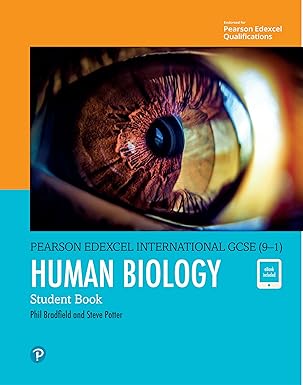The arctic ground squirrel exhibits the most extreme example of the hibernation adaptation, cooling its body to sub-freezing temperatures.
International GCSE Human Biology
Working on an International GCSE in Human Biology, students will learn the basics of human physiology, the reproductive system, cells and diseases. There are also lessons covering the environment and microorganisms, but (unlike the ‘regular’ Biology GCSE) you avoid having to develop a detailed understanding of the plant world.
Specialising in Human Biology provides a solid footing for those looking to study in areas such as sports science, physiotherapy and science-related courses at A level as well as providing a useful general knowledge of how our bodies work.
Human Biology International GCSE
£14.99 / month and a £9.99 sign-up fee
How does a course work
Step one – Subscribe to our online course materials
Subscribe to the courses you wish to study. The courses contain all the study material you require to pass your chosen subject including many self assessment questions and assignments with comprehensive suggested answers. The course also includes assignments which you can choose too have marked by one of our fully qualified tutors
The minimum subscription period is 6 months, after that you can cancel your subscription at any time. If you wish you can optionally purchase a physical course pack at the point of enrolment.
Step two
You will be allocated a tutor from our bank of PGCE qualified tutors. Your tutor will arrange a free 15 minute induction call with you to introduce themselves and the course to you. As you require further assistance, you can purchase:
- Tutorial Time in our virtual classroom,
- Assignment Marking and Mock Exam Marking,
Course Outline
Throughout this challenging International GCSE, students will learn what makes up a human body and how it functions throughout the course of a lifetime. Scientific facts will be detailed and explained throughout the course, enabling students to understand not only the science behind complex topics such as the reproductive system, but also how this relates to the world we live in.
While studying each of the modules detailed below, students will be encouraged to read widely and practise a number of experiments that can either be carried out at home within a supervised environment. Although not essential to exam success, these practical experiments may prove useful, helping students with practical methodology and the recording of data.
The lessons are planned so that all the material and preparation required for the final examination papers are in the following five course modules:
Module 1: Cell Processes
- Cells, Tissues and Organs
- Movement of Substances into and out of Cells
- Respiration and Enzymes
Module 2: Human Physiology A
- Nutrition
- The Circulatory System
- Heart Disease and Exercise
- Breathing and Gas Exchange
Module 3: Human Physiology B
- Homeostasis and Excretion
- Sensory Receptors
- The Nervous System
- Bones, Muscles and Joints
- Hormones, Drugs, Liver, and Kidney Failure
Module 4: Reproduction and Heredity
- Reproduction
- Chromosomes, Genes and Nucleic Acids
- Cell Division
- Genes and Inheritance
- Gene Technology
Module 5: Microorganisms, Disease and Environment
- Pathogens and Disease
- Defence against Disease
This Oxford Home Schooling course is designed to prepare home learners for the Edexcel International GCSE Human Biology specification 4HB1.
Exams and Assessment
The course is assessed by two written papers.
Both papers are 1 hour and 45 minutes long, are marked out of 90. Each accounts for 50% of the total mark in the examination.
Both papers examine the entire subject content for the specification and include:
- multiple choice questions
- short answer questions
- calculations
- extended open-response questions
Course duration and study time
The recommended number of study hours for this course is 200 hours.
Frequently Asked Questions
Why should I choose Oxford Home Schooling?
- Oxford Home Schooling is a long-established educational company that prides itself on
- treating every student as an individual
- excellent customer service
- comprehensive, quality courses.
- We’re rated ‘Excellent’ on Trustpilot by students who have studied with us.
- We provide online and printed resources so you can study your way – other providers do not give you that choice.
- We make it easy for you to home-educate your children with our flexible schedule, tutor support, and subscribtion based payment plan.
- Every year we help hundreds of children who have left mainstream education obtain the qualifications they need to progress and achieve their goals.
Can I complete the IGCSE Human Biology exam in one year?
Our cut-off for enrolling on an A level Spanish course for the following summer examination series is mid-October each year. So yes you can. However, remember that you will still need to fit around 200 hours of study time into your schedule before the examination. The earlier you enrol, the less study you must do each week!
What is an International GCSE?
Pearson Edexcel International GCSE (9–1 grades) are directly comparable to the UK GCSE specifications, with appropriate international content and assessment that will enable successful progression for learners.
Pearson Edexcel International GCSEs are studied in over 80 countries worldwide and they are very popular in independent schools in the UK. Available in 37 subjects, they are equivalent, grade for grade, to UK GCSEs and accepted by universities globally. Aimed at learners aged 14 to 16, they provide the skills and knowledge needed to progress to A Levels, International A Levels, university and into employment.
Full details of Pearson Edexcel’s International GCSEs can be found here
Is there an age limit?
When can I enrol?
Once you have enrolled, you will get access to your course online immediately and your printed course materials will arrive a few days later.
When will I sit my exam?
How and when do I book an exam?
The final date for booking summer exams with the exam board without incurring late entry fees is the 21st of February. You should book your place at an exam centre well in advance of this date. Start looking once the autumn term begins.
All the information you need to book an exam centre can be found in our Exams Hub. Here you will find
- detailed instructions
- entry codes needed to book exams
- our map of examination centres where our students have taken exams in recent years.
Tutors & Exams offers discounts to Oxford Home Schooling students and has ten current exam venues across the UK: Birmingham, Bolton, Coventry, Doncaster, High Wycombe, Romford, St Neots, Taunton and Wimbledon.
Pearson Edexcel also publishes a list of exam centres that accept private candidates. This won’t list every available centre, so if there’s nothing shown in your area, we recommend contacting local schools and colleges directly.
How much does an IGCSE examination cost?
Can I enrol for both the Biology and Human Biology IGCSE courses?
Yes, you can. Whilst there is some overlap between the two syllabuses this is not a combination which the examination board has prohibited. There are some topics which are required by both specifications.
Which is easier, Biology or Human Biology?
These two IGCSEs are designed to be equally challenging but, depending on your study background, you may find it more interesting to concentrate on humans than to look at plants and the environment as well.
Recent scientific articlaes from our Blog
The Chemistry Of Fireworks
The vibrant colours you see in fireworks are not random; they are carefully engineered by including different metal salts and metal oxides.
Where Did Saturn’s Rings Go?
By March 2025, the rings are set to appear side-on with Earth, meaning they will ‘vanish’ from our viewpoint.






